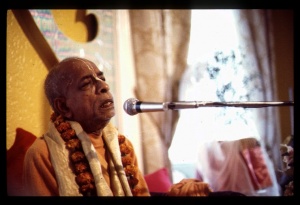SB 10.4.35: Difference between revisions
m (1 revision(s)) |
(Vanibot #0054 edit - transform synonyms into clickable links, which search similar occurrences) |
||
| (One intermediate revision by one other user not shown) | |||
| Line 1: | Line 1: | ||
{{info | {{info | ||
|speaker=ministers of King | |speaker=ministers of King Kaṁsa | ||
|listener=King | |listener=King Kaṁsa | ||
}} | }} | ||
[[Category:Srimad-Bhagavatam - Canto 10 Chapter 04]] | |||
[[Category:Bhagavatam Verses Spoken by the Ministers of Kamsa - Vanisource|100435]] | |||
<div style="float:left">'''[[Srimad-Bhagavatam]] - [[SB 10|Tenth Canto]] - [[SB 10.4: The Atrocities of King Kamsa|Chapter 4: The Atrocities of King Kaḿsa]]'''</div> | |||
<div style="float:right">[[File:Go-previous.png|link=SB 10.4.34]] '''[[SB 10.4.34]] - [[SB 10.4.36]]''' [[File:Go-next.png|link=SB 10.4.36]]</div> | |||
{{RandomImage}} | |||
==== TEXT 35 ==== | ==== TEXT 35 ==== | ||
<div | <div class="verse"> | ||
na tvaṁ vismṛta-śastrāstrān | :na tvaṁ vismṛta-śastrāstrān | ||
virathān bhaya-saṁvṛtān | :virathān bhaya-saṁvṛtān | ||
haṁsy anyāsakta-vimukhān | :haṁsy anyāsakta-vimukhān | ||
bhagna-cāpān ayudhyataḥ | :bhagna-cāpān ayudhyataḥ | ||
</div> | </div> | ||
| Line 17: | Line 22: | ||
==== SYNONYMS ==== | ==== SYNONYMS ==== | ||
<div | <div class="synonyms"> | ||
''[//vanipedia.org/wiki/Special:VaniSearch?s=na&tab=syno_o&ds=1 na]'' — not; ''[//vanipedia.org/wiki/Special:VaniSearch?s=tvam&tab=syno_o&ds=1 tvam]'' — Your Majesty; ''[//vanipedia.org/wiki/Special:VaniSearch?s=vismṛta&tab=syno_o&ds=1 vismṛta]-[//vanipedia.org/wiki/Special:VaniSearch?s=śastra&tab=syno_o&ds=1 śastra]-[//vanipedia.org/wiki/Special:VaniSearch?s=astrān&tab=syno_o&ds=1 astrān]'' — those who have forgotten how to use weapons; ''[//vanipedia.org/wiki/Special:VaniSearch?s=virathān&tab=syno_o&ds=1 virathān]'' — without chariots; ''[//vanipedia.org/wiki/Special:VaniSearch?s=bhaya&tab=syno_o&ds=1 bhaya]-[//vanipedia.org/wiki/Special:VaniSearch?s=saṁvṛtān&tab=syno_o&ds=1 saṁvṛtān]'' — bewildered by fear; ''[//vanipedia.org/wiki/Special:VaniSearch?s=haṁsi&tab=syno_o&ds=1 haṁsi]'' — does kill; ''[//vanipedia.org/wiki/Special:VaniSearch?s=anya&tab=syno_o&ds=1 anya]-[//vanipedia.org/wiki/Special:VaniSearch?s=āsakta&tab=syno_o&ds=1 āsakta]-[//vanipedia.org/wiki/Special:VaniSearch?s=vimukhān&tab=syno_o&ds=1 vimukhān]'' — persons attached not to fighting but to some other subject matter; ''[//vanipedia.org/wiki/Special:VaniSearch?s=bhagna&tab=syno_o&ds=1 bhagna]-[//vanipedia.org/wiki/Special:VaniSearch?s=cāpān&tab=syno_o&ds=1 cāpān]'' — their bows broken; ''[//vanipedia.org/wiki/Special:VaniSearch?s=ayudhyataḥ&tab=syno_o&ds=1 ayudhyataḥ]'' — and thus not fighting. | |||
</div> | </div> | ||
| Line 24: | Line 29: | ||
==== TRANSLATION ==== | ==== TRANSLATION ==== | ||
<div | <div class="translation"> | ||
When the demigods are bereft of their chariots, when they forget how to use weapons, when they are fearful or attached to something other than fighting, or when their bows are broken and they have thus lost the ability to fight, Your Majesty does not kill them. | When the demigods are bereft of their chariots, when they forget how to use weapons, when they are fearful or attached to something other than fighting, or when their bows are broken and they have thus lost the ability to fight, Your Majesty does not kill them. | ||
</div> | </div> | ||
| Line 31: | Line 36: | ||
==== PURPORT ==== | ==== PURPORT ==== | ||
<div | <div class="purport"> | ||
There are principles that govern even fighting. If an enemy has no chariot, is unmindful of the fighting art because of fear, or is unwilling to fight, he is not to be killed. Kaṁsa's ministers reminded Kaṁsa that despite his power, he was cognizant of the principles of fighting, and therefore he had excused the demigods because of their incapability. "But the present emergency," the ministers said, "is not intended for such mercy or military etiquette. Now you should prepare to fight under any circumstances." Thus they advised Kaṁsa to give up the traditional etiquette in fighting and chastise the enemy at any cost. | There are principles that govern even fighting. If an enemy has no chariot, is unmindful of the fighting art because of fear, or is unwilling to fight, he is not to be killed. Kaṁsa's ministers reminded Kaṁsa that despite his power, he was cognizant of the principles of fighting, and therefore he had excused the demigods because of their incapability. "But the present emergency," the ministers said, "is not intended for such mercy or military etiquette. Now you should prepare to fight under any circumstances." Thus they advised Kaṁsa to give up the traditional etiquette in fighting and chastise the enemy at any cost. | ||
</div> | </div> | ||
__NOTOC__ | |||
<div style="float:right; clear:both;">[[File:Go-previous.png|link=SB 10.4.34]] '''[[SB 10.4.34]] - [[SB 10.4.36]]''' [[File:Go-next.png|link=SB 10.4.36]]</div> | |||
__NOTOC__ | |||
__NOEDITSECTION__ | |||
Latest revision as of 18:58, 17 February 2024

A.C. Bhaktivedanta Swami Prabhupada
TEXT 35
- na tvaṁ vismṛta-śastrāstrān
- virathān bhaya-saṁvṛtān
- haṁsy anyāsakta-vimukhān
- bhagna-cāpān ayudhyataḥ
SYNONYMS
na — not; tvam — Your Majesty; vismṛta-śastra-astrān — those who have forgotten how to use weapons; virathān — without chariots; bhaya-saṁvṛtān — bewildered by fear; haṁsi — does kill; anya-āsakta-vimukhān — persons attached not to fighting but to some other subject matter; bhagna-cāpān — their bows broken; ayudhyataḥ — and thus not fighting.
TRANSLATION
When the demigods are bereft of their chariots, when they forget how to use weapons, when they are fearful or attached to something other than fighting, or when their bows are broken and they have thus lost the ability to fight, Your Majesty does not kill them.
PURPORT
There are principles that govern even fighting. If an enemy has no chariot, is unmindful of the fighting art because of fear, or is unwilling to fight, he is not to be killed. Kaṁsa's ministers reminded Kaṁsa that despite his power, he was cognizant of the principles of fighting, and therefore he had excused the demigods because of their incapability. "But the present emergency," the ministers said, "is not intended for such mercy or military etiquette. Now you should prepare to fight under any circumstances." Thus they advised Kaṁsa to give up the traditional etiquette in fighting and chastise the enemy at any cost.